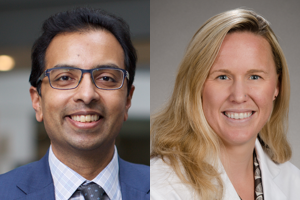Drs. Venu Pillarisetty and Lindsay Dickerson Receive $400,000 Fibrolamellar Cancer Foundation Grant

Drs. Venu Pillarisetty and Lindsay Dickerson
Dr. Venu Pillarisetty, Professor of Surgical Oncology, and Dr. Lindsay Dickerson, General Surgery Resident Research Fellow, received a $400,000 grant from the Fibrolamellar Cancer Foundation for their project, “Therapeutic modulation of tumor–infiltrating T cell function in fibrolamellar carcinoma.” Fibrolamellar carcinoma (FLC) is a rare liver cancer affecting children and young adults without underlying liver disease. Patients often present with large tumors and metastases. Surgical resection is the cornerstone of treatment and offers the best chance of cure, however recurrence rates after surgery are as high as 90%. FLC responds poorly to available systemic therapies, with an overall survival of less than two years with chemotherapy alone. With the recent success of targeted therapy in many solid tumor types, there has been a growing interest in immunotherapy—harnessing patients’ immune systems to fight cancer.F
Certain characteristics of the tumor environment and immune response in FLC indicate that the immune system is suppressed. Dr. Pillarisetty and his team in the UW TIME Lab aim to investigate how immunotherapy alters these attributes and thus may be employed to reverse the immunosuppression in FLC. They will characterize the distribution of immune cells in relation to cancer cells and evaluate the proliferation of specific T cells after immunotherapy. The team will use slices of FLC tumors from patients to test how combinations of immunotherapy influence the cancer–killing function of T cells. Finally, in collaboration with Dr. Kevin Barry at the Fred Hutch, Dr. Dickerson will develop a novel mouse model of FLC to make studying the disease easier. The ultimate goal is to discover immune system–based treatments that can prolong survival in—or even cure—FLC.
